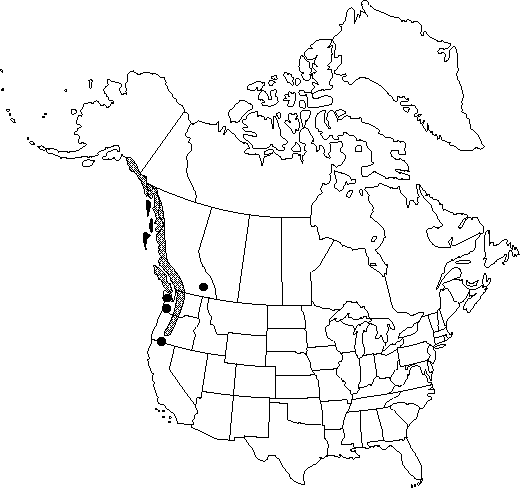Difference between revisions of "Chamaecyparis nootkatensis"
U.S.D.A. Div. Forest. Bull. 14: 79. 1897.
FNA>Volume Importer |
FNA>Volume Importer |
||
| Line 20: | Line 20: | ||
}}<!-- | }}<!-- | ||
| − | --><span class="statement" id="st- | + | --><span class="statement" id="st-undefined" data-properties=""><b>Trees </b>to 40 m or dwarfed at high elevations; trunk to 2 m diam. <b>Bark</b> grayish brown, 1–2 cm thick, irregularly fissured. <b>Branchlet</b> sprays pinnate. <b>Leaves</b> of branchlets mostly 1.5–2.5 mm, stout, occasionally glandular on keel, apex rounded to acute or acuminate, bases of facial leaves often overlapped by apices of subtending facial leaves; glands usually absent (circular when present). <b>Pollen</b> cones 2–5 mm, grayish brown; pollen sacs yellow. <b>Seed</b> cones maturing and opening the first year, in some populations the second year (J. N. <b>Owens</b> and M. <b>Molder</b> 1975), 8–12 mm broad, glaucous, dark reddish brown, becoming resinous; scales 4–6. <b>Seeds</b> 2–4 per scale, 2–5 mm, wing equal to or broader than body.</span><!-- |
-->{{Treatment/Body | -->{{Treatment/Body | ||
| Line 53: | Line 53: | ||
|publication year=1897 | |publication year=1897 | ||
|special status= | |special status= | ||
| − | |source xml=https://jpend@bitbucket.org/aafc-mbb/fna- | + | |source xml=https://jpend@bitbucket.org/aafc-mbb/fna-data-curation.git/src/9216fc802291cd3df363fd52122300479582ede7/coarse_grained_fna_xml/V2/V2_325.xml |
|genus=Chamaecyparis | |genus=Chamaecyparis | ||
|species=Chamaecyparis nootkatensis | |species=Chamaecyparis nootkatensis | ||
| − | |||
| − | |||
| − | |||
| − | |||
| − | |||
| − | |||
| − | |||
| − | |||
| − | |||
| − | |||
| − | |||
| − | |||
| − | |||
| − | |||
| − | |||
| − | |||
| − | |||
| − | |||
| − | |||
| − | |||
| − | |||
| − | |||
| − | |||
| − | |||
| − | |||
| − | |||
| − | |||
}}<!-- | }}<!-- | ||
-->[[Category:Treatment]][[Category:Chamaecyparis]] | -->[[Category:Treatment]][[Category:Chamaecyparis]] | ||
Revision as of 14:17, 27 July 2019
Trees to 40 m or dwarfed at high elevations; trunk to 2 m diam. Bark grayish brown, 1–2 cm thick, irregularly fissured. Branchlet sprays pinnate. Leaves of branchlets mostly 1.5–2.5 mm, stout, occasionally glandular on keel, apex rounded to acute or acuminate, bases of facial leaves often overlapped by apices of subtending facial leaves; glands usually absent (circular when present). Pollen cones 2–5 mm, grayish brown; pollen sacs yellow. Seed cones maturing and opening the first year, in some populations the second year (J. N. Owens and M. Molder 1975), 8–12 mm broad, glaucous, dark reddish brown, becoming resinous; scales 4–6. Seeds 2–4 per scale, 2–5 mm, wing equal to or broader than body.
Habitat: Coastal mountain ranges
Elevation: 0–1500 m
Distribution

B.C., Alaska, Calif., Oreg., Wash.
Discussion
Disjunct inland populations of Chamaecyparis nootkatensis occur in British Columbia and Oregon (V. J. Krajina et al. 1982).
In addition to variation in habit within the species, occasional plants have divergent forms of foliage. One collection (Canada, British Columbia, dry woods near Victoria, S. Flowers s. n., 1 Aug 1950, UC, WIU) has older foliage typical of the species, with all newer foliage strongly flattened, with facial and lateral leaves of strongly unequal size, and with smaller cones. In light of the foliar and habit phenotypes recognized in the horticultural literature (for example, A. J. Rehder [1949] listed, with full bibliographic citations, 22 published varieties and forms best considered as cultivars), no taxonomic significance is attached to this variation here.